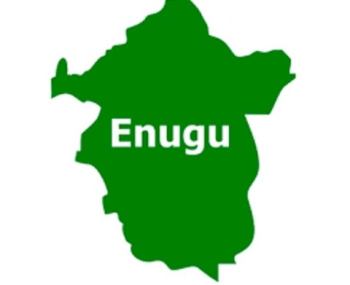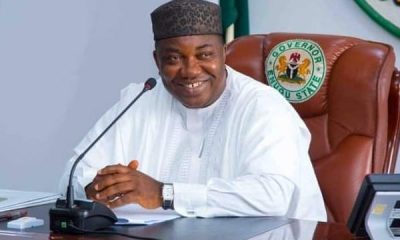Environment
Enugu residents decry high increase in house rents, urge govt intervention

Some residents of Enugu have decried the increase in house rents, describing the development as “unfortunate’’.
The residents expressed dismay that most of the housing estates built by government were for the rich as no civil servant in the state could afford them.
They appealed to the Federal and State Governments to provide low-cost houses for workers in the state.
Mr Kelechi Onwubuariri said his landlord increased his rent of a three bedroom flat from N300,000 to N400, 000 annually with a threat to eject any tenant who failed to comply after the expiration of the three months’ notice given to them.
“I moved into the house in 2016, and I have been paying N300,000 for a three bedroom flat and I am surprised when my landlord increased the rent to N400, 000 in January.
“We have appealed to him to reduce it but he asked us to leave his house if we are not ready to accept the new rent.
“To me, it is a wrong decision because we are finding it difficult to pay N300,000, not to talk of when it is N400,000,” Onwubuariri lamented.
Mr Nnamdi Ugwuoke said that his landlord increased the rent for his two room apartment from N120, 000 to N170,000 in January.
“I was shocked that the landlord will increase the rent at this austere period when we are struggling to survive from losses incurred during COVID-19 pandemic lockdown’’.
According to him, there has not been any rehabilitation on the property to warrant the increment.
“My toilet, doors and roofs are still the way they were when I rented the apartment and we buy water on a daily basis,’’ he said.
A student, Blessing Ifeanyichukwu added that house rents had been the bane of many students as they find it extremely difficult to cope.
“We do not only pay for rent, but we also pay agency and lawyer’s fees too,’’ he said.
A News Agency of Nigeria (NAN) survey conducted on Wednesday in different areas in the state capital showed that some landlords had increased rents on their properties.
For instance, in highbrow areas like Independence Layout, a two bedroom and three bedroom apartments had risen from N450,000 and N800,000 to N600,000 and one million naira respectively.
The rent for a duplex of four rooms and above presently stood at between N1.5 million and N3 million per annum depending on the owner of the building.
In Trans-Ekulu, a three bedroom apartment had risen to about N600,000 and N750,000, while a Duplex that was hitherto rented for N1 million was now N1.5 million.
The cost of renting a two bedroom flat and three bedrooms in Uwani and Achara Layout in Enugu South Local Government Area, had risen from N200,000 and N400,000 to N250,000 and N500,000 respectively, while a one room apartment of N100,000 rose to between N120,000 and N150,000.
A duplex in Achara Layout was now being rented for between N800,000 and N900,000, while a bungalow had increased to between N500,000 to N600,000.
Similarly in Ologo and Coal Camp in Enugu North Local Government Area, the rent had also been increased as a three and two bedroom apartments that was for N180,000 and N350,000 in 2021 increased to N200,000 and N400,000 respectively depending on the building.
In New-Haven, the cost of renting a duplex also had risen to N1.5 million annually, while three bedroom flat and bungalow stands at N700,000 and one million naira.
Some landlords who spoke to NAN attributed the increase to high cost of building materials which they said had tripled, thereby, forcing landlords to increase rents.
Speaking on the development, the General Manager, Enugu State Housing Development Corporation, Mr Chukwuemelie Agu attributed the increase to the high cost of building materials in the market.
According to him, it cost up to N10 million to build a bungalow with good finishing, and this affects how much they sell the buildings.
“The cost drivers such as land, rods, cements, roofs, paint, louvers, woods and others determine the cost and rent of a building,” Agu said.
According to Agu, they have constructed many housing units for civil servants in the state but not low-cost housing.
A landlord, Mr Gabby Okechukwu, said the increment was necessary to enable them have value for their investment, saying he increased rents for his properties because “it was long overdue’’.
“It is true that I built my house in 1992 when things were not expensive but recently, prices of goods and services keep increasing on a daily basis.
“I have a family to take care of, school fees to pay and this building is my only source of income. I increased the rent to survive,’’ he said.
Don Peter, another landlord noted that the prices of materials used in building houses had doubled what the price used to be. .
According to him, one bundle of Cameroon zinc usually sold for N19,500 is now N27,000, a bag of cement sold for N1,500 and N2, 500 is now being sold at between N4,000 and N4,500.
Also, 12mm rod and 16mm rod that were being sold at N1,500 and N3,500 respectively was now selling at N5,500 and N9,000.
This and other building materials, he said had made building a house very costly, adding that if one did not increase rent, it would take a long time to recoup money invested in it. (NAN)
Environment
Prolonged Public Holidays Come with Negative Economic Effects on Citizens – Anambra Residents

Anambra residents have slammed the additional day approved by the Federal Government for the Muslim faithful to celebrate the 2024 Eid-Ei-Fitr, saying this will have negative effects on the economy.
The Federal government had early declared April 9 and 10 as Muslim-Ummah for the successful completion of a month’s spiritual rejuvenation.
Reports says that residents of Anambra capital city believe that the additional day which they did not plan for will result in economic hardship to the citizenry.
Most respondents believe that people had planned to resume their economic activities instead of wasting their time staying at home doing nothing..
Former Chairman, Awka Chamber of Commerce, Chief Felly Akosa, described the additional day to the two days approved earlier as “unfair to the economy of the country as people were unprepared for the additional day.
Akosa said that although it is right for the Muslim faithful to celebrate their holiday after a month-long fasting, the process needs to be carefully planned for in place of the additional rest day which could inhibit business activities.
Chief Damian Okeke-Ogene, National Vice President of Igbo Apex Social Cultural body, Ohanaeze Ndigbo, said the policy would cause huge economic waste as businesses are put on hold,
He advised that, in future, a proper and well planned programme needs to be in place before declaring a public holiday for any celebration that will be national.
“Our economy and other sectors are not very healthy,” and it would, therefore be appropriate to plan well to avoid declarations that will hamper the citizens’ welfare.
Mazi Christian Beluchukwu, a business man in Awka, described the extension of the Eid-El-Fitr public holiday to Thursday, April 11, as an added hardship for the citizenry.
Beluchukwu said that any public holiday for three days, April 9 to 11, to celebrate any feast in the country is an economic loss to the nation.
He said that it was best to stick to the two-day national public holidays as this gives room for the people to plan their activities very well.
He stated that his wife went to a public hospital on Tuesday and was unattended to because there was no doctor on seat to provide medical attention.
“She resorted to visiting a private hospital which cost extra money which the public hospital is expected to handle at a reasonable cost. (NAN)
Environment
World Bank Fund: Corporation Rehabilitates Treatment Plant, Reticulation in Jos South

The Jos Water Services Corporation (JWSC) has said that the World Bank fund received would be used to boost water supply to Bukuru and environs in Jos South Local Government Area.
Mr Apollos Samchi, the Managing Director of the corporation, said that N1.7 billion would be expended on the rehabilitation of water treatment plant, over head steel tank and laying of pipes to homes of consumers.
Samchi, who disclosed this on Friday in Jos, during a two-day capacity building workshop, said that the projects were expected to be completed in four months.
Reports says that the workshop organised for contractors has at its theme: “Implementation of Environmental and Social Management Plans for Projects in Jos South.
The MD said that the projects would ensure steady provision of potable water to residents in Gyel and Kurgiya in Jos South Local Government Area.
He said the treatment plant when rehabilitated would pump out 5,000 cubic litres of water daily.
The MD further stated that the reticulation exercise would cover residents who weren’t initially connected to public water supply in the area.
Samchi said that the essence of the workshop was to ensure that the contractors were trained to develop adequate measures and controls to minimise and mitigate potential environmental and social risks that could adversely affect the project implementation.
He called on all the contractors handling the projects to ensure that they adhered to the environmental and safety standards and deliver within the specified timeframe.
In his remarks, Mr Jonathan Malann, the Plateau Project Coordinator, Sustainable Urban, Rural Water Supply, Sanitation and Hygiene programme (SURWASH), also advised contractors to adhere to the environmental and safety standards as provided by the World Bank.
The Federal Government had received $700m financing from the World Bank to ensure that all its people have access to sustainable and safely managed WASH services.
The seven participating states are Plateau, Delta, Ekiti, Gombe, Imo, Katsina, and Kaduna.(NAN)
Environment
Erosion Control Project: Gombe SEC Approves N389m Compensation for Residents

The Gombe State Executive Council (SEC) has approved payment of N389 million as compensation for residents that would be affected by the gully erosion control project at Federal College of Education (FCE) Technical and its surrounding communities.
The Commissioner for Finance, Gombe State, Malam Mohammed Magaji, stated this at the end of the SEC meeting on Friday in Gombe.
Magaji said the payment, which would commence immediately, would be for individuals and organisations along the gully erosion site.
He said almost 1000 persons were expected to benefit from the gesture.
According to him, the compensation is part of the requirements of the World Bank, which specifies that such payments be made to property owners.
Magaji said the payment would also be made to ensure seamless resettlement of affected persons.
“The beneficiaries are in hundreds, almost a 1,000 people; there is compensation for houses, and also for business premises.
“There is also stipends for the elderly living around that area so that they are able to have good livelihood,” he said.
The commissioner for Education, Hajiya Aishatu Maigari, also said the SEC approved upgrade of the five mega senior secondary schools in the state to sustain improvement in the education sector.
Maigari said the upgrade would be carried out based on the needs of each of the schools.
She stated that infrastructure in some of the schools were already being upgraded to global standards.
“We have seen construction of toilets, installation of solar-powered light, construction of roads, school clinics, boreholes and many more,” she said.
The News Agency of Nigeria (NAN) reports that the state government had on Nov. 23 signed a N12 billion contract with Triacta Nigeria Ltd. for a 21-kilometre gully erosion control work in six communities within Gombe metropolis.
The project is under ACRESAL project, a World Bank-assisted project to address the challenges of land degradation and climate change in northern Nigeria. (NAN)





























